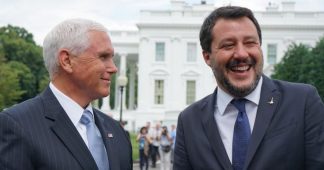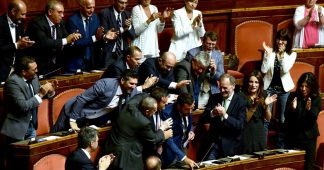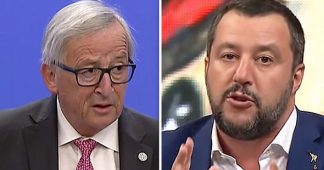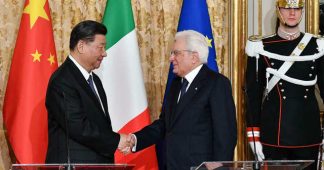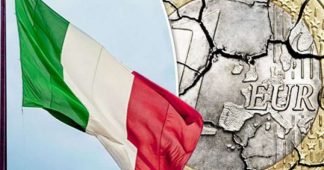Matteo Salvini’s enthusiasm for Trump did not win him a meeting with the president; and his Washington visit this week may undermine Italy in Europe
By Teresa Coratella
21st June, 2019
Matteo Salvini’s visit to the White House this week was short in duration, but long on meaning. During his stay, he met Mike Pence and Mike Pompeo, and probably hoped to see Donald Trump too, although this never materialised.
The trip’s official goal was to strengthen bilateral cooperation between Italy and the United States. But there are other motivations for Salvini to have gone. Firstly, he will have wished to present himself as a first point of contact in Europe for the US, filling a gap left by the difficult relations between Washington and Berlin and Paris. Secondly, he hopes to be the European face of the Trumpist sovereigntist model and its natural ambassador in Europe. Thirdly, he is conscious of impending European Commission disciplinary proceedings over Italy’s public spending plans; securing potential economic and political backing from the US could prove useful in the coming months.
Of course, the fact that Salvini was on the other side of the Atlantic posed no obstacle to him continuing his domestic political campaign. He seized the opportunity to relaunch his personal and political campaign for a flat tax. He may have articulated this relaunch in softer tones than previously, but his goals remain to cut taxes on companies, and from 2020 on household incomes as well. This was the key pillar of the League’s political manifesto at the 2018 general election, and it could yet reinforce support among the prosperous business community in the north of Italy. He even called for parliament to approve a “Trumpist” budget law for Italy over the next few weeks.
But this trip was just not about Italian affairs. During the 24-hour stay, Salvini effectively travelled all over the world, taking up numerous global and multilateral dossiers, all of strategic and urgent relevance for both the US and Italy. Among his roamings featured: Russia; China’s economic dynamism in Europe; Iran; the status of NATO; and, of course, Italy-US relations. He was more reticent on Venezuela, a matter that has provoked sharp confrontation with his Five Star Movement coalition partners: the deputy prime minister confined himself simply to remarking that supporting Nicolas Maduro is a position of little use to anyone
On Russia, Salvini was not in an easy position. He is a traditional admirer of Vladimir Putin, but recent months have seen him shift from Moscow to Washington in terms of who he decides to make appreciative noises about in public. His support for Trumpism is now virtually a daily agenda item, especially for domestic purposes. But he retains his political support for ending sanctions on Russia despite the isolated position this leaves him with in Europe, including among Visegrad potential allies. Putin is scheduled to visit Italy this summer, following his meeting with the prime minister, Giuseppe Conte, in Moscow in October. This new meeting will likely set the scene for harsh battles for the Five Star Movement and the League in terms of achievements and public visibility.
On China, Salvini found himself in even trickier waters. He made great show of the role of guarantor he would play to prevent any risk to national and international security through cooperation with China. This stands in distinct contrast to the flurry of interest in Italian-Chinese cooperation on the Belt and Road Initiative, fronted up by Italy’s other deputy prime minister, Luigi Di Maio, in his position as economic development minister, which prompted a negative reaction from the US at the time.
And on Iran, Salvini publicly declared that Italy’s relations with Tehran had changed, as it is impossible to maintain normal relations with a country that wants to destroy Israel.
That was not it, though: the United Nations found itself in his sights too. He criticised the internal dynamics of the UN, including its rules and its alleged lack of transparency. The attack came as a reaction to the recent worries expressed by the UN about Italy’s new national security decree and the government’s punitive measures on public security and support to refugees and migrants.
But NATO was probably the key bone of contention. Italy is not complying with the 2 percent of GDP minimum spending on defence requested by the US and agreed by NATO itself. The League’s and the Five Star Movement’s positions are far apart on this question. The Five Star Movement stance is suggestive of a gradual Italian disengagement from NATO and international military missions. This runs counter to US requests for Europe, and Italy, to step up in this regard. Salvini, in contrast, is a great supporter of Italy’s military power and wants his government to work closely with the US as a privileged partner in Europe and NATO.
He may have won the recent European Parliament election in Italy, but those results will bring Salvini little leverage in Brussels given the League’s position outside the major political groupings. Salvini’s US visit was therefore a critical opportunity for the deputy prime minister to project himself on the international stage. It remains to be seen how far it will enable him to get round, and above, domestic and European constraints. Looming challenges over infringement procedures against Italy, ongoing Europe-US relations, and defence and security will reveal how significant this visit really was. Conte is in Brussels today trying to reopen the discussion about financial rules and their implementation for Italy. Salvini’s trip could actually undermine the prime minister’s efforts at dialogue with his European counterparts and weaken Italy’s position at this delicate moment for Europe.
Published at https://www.ecfr.eu/article/commentary_salvini_goes_global
